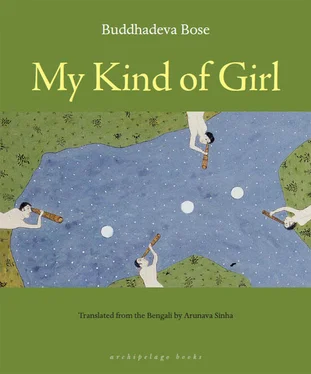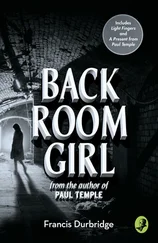Afternoons, the three of us would often go into town on two bicycles, sometimes for cutlets at Ghosh-babu’s famous shop, sometimes to the only cinema hall in town, sometimes to the riverside with packets of peanuts. I never learned how to ride a bicycle, despite my best efforts, but I took many a ride on those two-wheelers, a burden sometimes on Asit, sometimes on Hitangshu, on long journeys, standing or sitting behind them. Many evenings were spent in the fields of old Paltan, sitting or lying on our grass sofa, small stars piercing the sky, thorns piercing our clothes, the lantern on the front porch of Hitangshu’s house piercing the dark and shining dimly, at a distance. Hitangshu couldn’t spend much time with us in the evenings; he simply had to get back home by eight, as his family ordered. Neither Asit nor I was bound by such stern directives: we’d sit there in the darkness, call out to Hitangshu softly on our way back, and he’d interrupt his studies to covertly exchange a few words with us.
So the three of us were in love with one another, just as all three of us fell in love with someone else, back in Dhaka, back in old Paltan, back in 1927.
Her name was Antara. It was a rather sophisticated name for the Dhaka of those days. But nothing about her family suggested Dhaka, so why should their daughter’s name smack of it? The gentleman was extremely westernized — or so we felt then — while the lady dressed in a way that made people mistake her for a young girl from behind. And as for her daughter, their daughter, what can I say about her? She strolled in the garden in the morning, sat with a book on the veranda after lunch, went for walks on the road in the evening; practically brushing past us, her voice could be heard at times — back in Dhaka, in ancient 1927, when it was not easy to even catch a glimpse of a girl, when a portion of a sari behind the closed doors of a carriage was a hint of heaven — and here was this girl, whom we would see in a different sari each day, and who was named Antara on top of that. . We did not have the ability not to all fall in love with her.
But it was I who discovered her name. I had to sign for the bread every day, and one day I saw a new name in clear Bangla script on the bread seller’s register: Antara Dey. I looked at the register for a while, was possibly late in returning it, and then checked with Hitangshu in the evening, “What’s her name, Antara?”
“Whose. .” But Hitangshu understood immediately and said, “Possibly.”
Asit said, “They call her Toru.”
Toru! There must have been at least two or three hundred Torus in Dhaka, but at that moment I felt, and I realized Asit felt too, that the language had no word sweeter than Toru. Hitangshu, of course, had to say something flippant and knowing, for the subject, or subjects, of our conversation were tenants of the ground floor of his grand house; unless he had more on the family than we did, he wouldn’t be keeping his advantage over us. So he wrinkled his long nose and said, “From Antara to Toru — I don’t like it.”
“Why not, I like it very much,” I raised my voice, though my heart fell.
“If it was up to me, I’d have called her Antara.”
What audacity. What temerity! He’d have addressed her, and that too by her name! My face reddened with the heat of protest, and I was marshaling some sharp expressions in my mind, when Asit suddenly said, “Me too.” Traitor!
We would have these small quarrels quite frequently. There wasn’t a day when we didn’t talk about her, and there wasn’t one conversation where the three of us were unanimous. She had been in a blue sari the other day, did she look better in it or the purple one? When she’d been walking in her garden that morning, was her hair in a ponytail or down? The other evening, when she’d sat on the veranda with paper and pen, was she writing a letter or practicing arithmetic? We would contend over such issues at the top of our voices. The biggest argument was over a strange topic: did her face resemble the Mona Lisa’s a lot, slightly or not at all? I had just seen a print of the Mona Lisa and shown it to my friends; suddenly the words escaped from me one day: “She looks a lot like Mona Lisa.” We expended many words on the subject without coming to a conclusion, but the good thing was that we started referring to her as Mona Lisa. No matter how much melody there was in Antara, how much sweetness in Toru, the three of us couldn’t possibly refer to her by the same name everyone else used — devising another name which nobody else knew was almost like coming into possession of her.
We’d tell Hitangshu quite often, “You’re bound to become acquainted, it’s the same house, after all,” and Hitangshu would blush at this suggestion of intimacy and say, “What rubbish!” Which meant it could happen, and we used to speculate a lot about this, though we had accepted nevertheless that none of this would happen, that it was all talk, idle talk.
One evening, the three of us were on our way back from the Ramna River, me perched behind Hitangshu on his bicycle. We were chatting peacefully on that desolate path when Hitangshu suddenly stopped talking and wobbled on his cycle; I was about to be thrown off, and trying to regain my balance I clutched at the collar of his shirt, which made him scream in pain, and finally I found my feet again. We heard a deep baritone just then, speaking in English, “Take care, young men!” Mr. Dey stood before us, we saw, along with his wife and daughter. Asit had his bicycle turned at an angle, one foot on the ground, a heroic expression on his face.
“Really, you must. .” as Mr. Dey spoke, his eyes set on Hitangshu. “Oh, it’s you. Keshab-babu’s son!”
I watched as Hitangshu stared stupidly at his father’s tenants.
“And them? I see the three of you together always. Friends, I assume? Wonderful. I like the company of young men, you must visit us sometime.”
They continued on their way. We stepped off the road and lay down, side by side, flat on the grass. A little later, Asit said, “What a to-do! Hitangshu got nervous, didn’t he?”
“No, no, why should I be nervous? Just that the brakes. .”
“Never happened before, and it had to happen now, just as we ran into them.”
“Fine. So what? I didn’t hit anyone or fall over anyone. Just that I tried to brake suddenly. .”
“No, no, you got off fine, only your face looked funny. And as for Bikash. .”
I snarled as soon as my name was mentioned. “Shut up. It isn’t funny.”
“I think she smiled a little,” Asit still didn’t relent. (There’s no need to explain who he was referring to.)
“I give a damn if she did,” shouted Hitangshu, but the shout was more like a sob.
“Did you see, Bikash? Was it like the Mona Lisa’s smile?”
“Don’t make fun of what you don’t understand.” My voice broke. I couldn’t sleep well that night, remained half-dead for two days more and heartbroken for seven.
Still, setting aside our collective chagrin, Asit was undoubtedly the street-smart one amongst us. He kept saying, “Why don’t we pay them a visit?”
“Are you out of your mind?”
“Why? Mr. Dey asked us, didn’t he?”
Eventually even Hitangshu and I came to agree that Mr. Dey had indeed asked us to visit, practically invited us; he would be extremely pleased to see us, not visiting would be tantamount to showing disrespect. We became increasingly concerned with preserving his status. Every morning we would decide, “Today,” every afternoon we would say, “Not today.” Sometimes we saw them in their garden, on cane chairs; sometimes we saw a car parked outside their gate and realized that Mr. Das, the only barrister in town, was visiting them; sometimes we concluded from the lack of visible activity that they weren’t home. Once in a while we saw Mr. Dey alone in his garden, reading the newspaper. These seemed like opportune moments but our feet stopped moving just as we approached their garden gate, Asit’s not as much as Hitangshu’s, Hitangshu’s not as much as mine; a little nudging and whispering, and eventually we walked past Tara Kutir, toward the main road. Most of the time we felt our visit would annoy them, and immediately we’d argue, why be annoyed, and why were we hesitating so much, didn’t people visit people! We were neither thieves nor scoundrels, all we’d do was visit, take a seat, make conversation, leave — that was it!
Читать дальше












